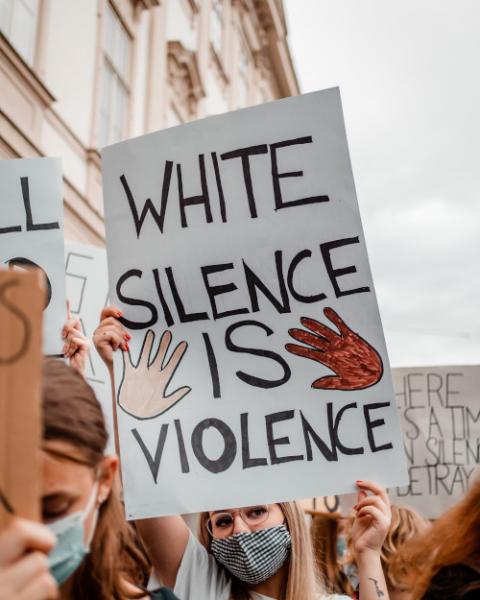Protesters stand with a sign reading "Racism Is Our Longest Plague" in Washington Aug. 28, 2020, during the "Get Your Knee Off Our Necks" Commitment March on Washington 2020 in support of racial justice. (CNS/Reuters/Tom Brenner)
The day this column is published, I am scheduled to be in Waterford, Ireland, delivering an academic paper at an international conference on the study of spirituality. The theme, "Spirituality, Critical Reflection, and Professional Practice in an Uncertain World," has drawn scholars from around the globe to discuss the manifold ways spirituality can inform and respond to what the Second Vatican Council famously called "the signs of our times."
The subject I'll be addressing centers on how we might develop a Franciscan spirituality of anti-racism, drawing on the life, writings and legacy of St. Francis of Assisi for contemporary spiritual seekers.
It may seem counterintuitive to turn to a 13th century saint for wisdom in combating white supremacy in our contemporary context, but I believe that St. Francis, and the spiritual tradition that he co-founded with St. Clare, does have something to offer us today.
However, I believe that the distinctively Franciscan approach to evangelical poverty — what Franciscans profess in Latin as sine proprio, to "live without anything of one's own" — can give white Christians a spiritual framework for fighting white supremacy within a systemically racist society such as ours.

(Unsplash/Simone Fischer)
Most people hear the word "poverty," which is one of the three vows most women and men religious profess when they join their order or congregation, and they think of abject or material poverty. In other words, these people associate the word poverty with its common-sense meaning, which refers to the lack of those basic things necessary for fundamental human flourishing (such as food, clothing, shelter, healthcare, etc.). While evangelical poverty certainly entails a "lack" — at least a voluntary commitment to resist unmitigated appropriation of things, property and wealth — it is not simply about having less of any particular thing (let alone those things needed for basic human flourishing).
The use of the qualifier "evangelical" is important. In the Franciscan tradition, the model of the kind of poverty Francis and Clare embraced was Jesus Christ himself as represented in the gospels (evangelical from evangelium for "gospel"/"good news").
For Jesus, and later Francis and Clare, poverty was never an end in itself. Jesus did not proclaim "blessed are the poor" (Luke 6:20) in order that his followers would willfully starve to death, be unnecessarily exposed to the elements or become homeless. That kind of abject or material poverty is an evil; it is the privation of good. It is precisely the thing that God's prophets had protested for millennia, especially in the face of unjust rulers and communities.
Instead, poverty for Jesus was a means to an end, a framework for living in the world that recognizes interdependence with others and does not put up barriers to relationship. When you have a lot of wealth and property, it does not take long to become preoccupied with protecting that wealth and property (that is, keeping others away) and accumulating more for oneself.
Jesus modeled a voluntary surrender of wealth and property, choosing instead to live communally with his friends and followers, and relying on the generosity that God calls each of us to show one another. This model leads to what the Acts of the Apostles describes as what the Christian community ought to look like in practice: "The community of believers was of one heart and mind, and no one claimed that any of his possessions was his own, but they had everything in common" (4:32).
Advertisement
Francis and Clare were drawn to the awe-inspiring love of God in Jesus modeled in the willful surrender of power, wealth and control witnessed in the incarnation (Philippians 2:6-11). Sometimes denoted by the Greek word kenosis, God shows us in Jesus what it means to voluntarily empty oneself of power and control. This is what inspired the first Franciscans.
These medieval saints realized that unjust and unhealthy dynamics in their 13th century society privileged some while disadvantaging others. Each in their own way, Francis and Clare were raised in social locations of privilege and power. But their ongoing conversion to a deeper life of Christianity through gospel living challenged them to work toward surrendering those unearned advantages, and they described this practice as embracing poverty.
The French medieval historian Jacques Dalarun, in his book Francis of Assisi and Power, makes the point that Francis embraced evangelical poverty as a strategy for the runcination of social power. Dalarun explains:
[Francis] chose to establish in a rule of religious life the condition shared by the most powerless classes in the society of his time: destitution, precariousness, itinerancy, and manual labor. He showed a loathing for all forms of power that went far beyond the scorn of the world as found in the monastic and ascetic tradition. With Francis, there is less of a merely visible break with the world; at the heart of his life there is instead more intransigence toward any compromise with the world and its powers.
In his foreword to Dalarun's book, historian and Franciscan Fr. Michael Cusato notes that:
Francis was keenly aware not only of the various forms of power that were operative in Assisian society (e.g., money, military force, ownership of land and property, class consciousness, learning, and so forth) but most especially of how that power came to be used to the detriment of its weakest members: the poor.

(Unsplash/Edgar Chaparro)
I believe that there is spiritual wisdom in this way of approaching Christian life through evangelical poverty, especially for white people in a systemically racist society and church.
First, it's important to remember that systemic racism is about power. Properly speaking, racism refers to a whole system and culture, structures and institutions, laws and their enforcement, practices and perspectives that shape an entire society and the church that exists in the very same world. As anti-racist activist and author Ijeoma Oluo notes, "Racism is any prejudice against someone because of their race, when those views are reinforced by systems of power."
The second thing to remember is that racism is a white problem and white supremacy is our responsibility to combat. Just as economic inequality — whether in the Middle Ages or today — is not the problem of the materially poor but of those who continually acquire wealth and power for themselves, so too the injustice of white supremacy and systemic racism are the responsibility of those who benefit from it.
White Christians like me, who unwittingly benefit from these unjust power systems predicated on race, have a responsibility to attune ourselves to these dynamics always already operating around us. White supremacy persists in large part because the white folks who benefit from it (and reinscribe it) are unable or unwilling to see how it functions in little and big ways. While no one individual can change centuries of structural injustice any more than Francis and Clare eradicated material poverty in their time, we can all respond to our baptismal call to help usher in the kingdom of God.
As Fr. Bryan Massingale, the Fordham theological ethicist, has said often, white supremacy and systemic racism is a "soul sickness." Indeed, it is a social, political, ecclesial and spiritual ailment that needs to be diagnosed and treated. The Franciscan spiritual tradition generally, and its understanding of evangelical poverty particularly, may be one more resource that white Christians can embrace in combating the persistence of white supremacy and addressing this "soul sickness" in our society and church.





